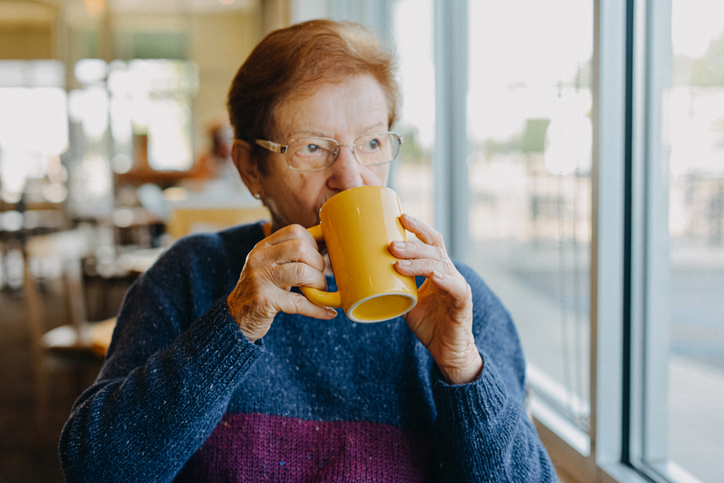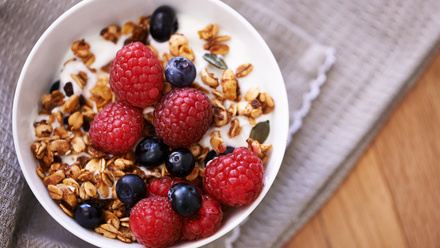Good hydration (drinking enough fluid) is important for all of us for lots of reasons, including preventing dehydration.
Older adults can be at higher risk of becoming dehydrated and may need to remember to drink regularly throughout the day.
Dehydration is a serious condition which can occur when your body does not get enough fluid to meet your needs. Dehydration can be due to low intake of fluid (known as low intake dehydration) over a period of time. In people who are acutely ill it can occur over a short period of time.

This Food Fact Sheet will help you understand what dehydration might look like and how to either stop it from happening or manage it and how much fluid we need to drink.
You can be at even higher risk of dehydration if you:
- are dependent on others for drinks
- have difficulty swallowing
- have diarrhoea and/or vomiting
- have a high temperature (fever)
- have not drunk enough after strenuous physical activity
Why is dehydration a problem?
Drinking enough fluid is important and not drinking enough can have major impacts on your health and wellbeing.
Dehydration can lead to:
- Headaches
- Tiredness
- Confusion
- Lack of concentration
- Constipation
- Urinary tract infection (UTI)
It can be really hard to spot dehydration because there are no easy-to-use tests that tell us whether someone is dehydrated or not. Signs (such as urine colour, thirst and a dry mouth) that may be suggested as showing dehydration do not actually work in older adults.
Drinking enough and preventing dehydration
Drinking enough fluid every day is key - you don’t have to drink lots of water to be well hydrated!
However, as you get older, you might not recognise the feeling of thirst in the same way that you used to and so you may need to find other prompts to help you to have regular drinks.
All fluids count so choose:
- Your preferred type of drinks which can include water, those containing caffeine (such as tea, coffee, hot chocolate), milk, squash, fruit juice, fizzy drinks and weak alcoholic drinks up to 4% alcohol by volume (ABV). Water, tea, coffee (without added sugar) and milk are the best choices for our teeth
- Your preferred temperature of drinks whether that is hot, cold or room temperature
Think about how often you need to have a drink during the day and what could help remind you to have a drink, for example:
- Have a full glass of fluid when you take medications instead of just a few sips
- Make a point of having a drink with your meals and also in between meals
- Make sure social occasions, such as meeting up with a friend include having a drink together
If you are a woman aim to drink at least 1,600ml (3 pints) fluid every day and if you are a man aim to drink at least 2,000ml (3½ pints) fluid every day. Aim to drink a bit more when the weather is hot. If you often don’t drink enough, try to gradually increase the amount you drink – perhaps having one extra drink a day for a few days until it becomes a habit.

Select the best cup, mug or glass for you both in terms of its size and also how easy it is for you to lift and to drink from. Some people may also find being able to see the type of drink they are having helpful so you could try using a clear mug, cup or glass. Cups, mugs & glasses can be lots of different sizes so it’s important to know how much fluid your preferred ones hold, so that you know how many of them you need to drink each day.
If you drink less than the amount advised above and are worried that drinking more might cause you problems controlling your bladder, please discuss this with a healthcare professional. Odd as it sounds, if you do have problems controlling your bladder not drinking enough fluid will not stop this.
Other things that might be helpful
If you also have a poor appetite and/or are at risk of malnutrition, the following might help:
- Choose drinks which contain some nutrition such as milky drinks (malted drinks, hot chocolate, milky coffee, milkshakes, lassi and peanut punch)
- Try not to have drinks just before meals to avoid feeling too full to eat
- Avoid low energy versions of drinks, for example skimmed or semi-skimmed milk
If you have any of the following symptoms ask for advice from a healthcare professional. Your health professional may refer you to a speech and language therapist or another practitioner who specialises in swallowing difficulties:
- Choking or coughing when drinking
- A change in the sound of your voice whilst/soon after eating e.g. your voice sounds ‘wet’ or gurgly
- Difficulty swallowing
Top tips
- Dehydration can affect anyone, but it is more common for older adults
- Dehydration can make you unwell
- Drinking enough fluid can help prevent dehydration
- Choose drinks that you prefer
- Common signs of dehydration do not work in older adults
- The simple steps outlined above should help you to drink enough to meet your body’s needs. If these ideas do not seem to help, ask for further advice from a healthcare professional
Source(s)
- Volkert D, Beck AM, Cederholm T, Cruz-Jentoft A, Goisser S, Hooper L, et al. ESPEN guideline on clinical nutrition and hydration in geriatrics. Clin Nutr [Internet]. 2019;38(1):10–47. Available from: https://doi.org/10.1016/j.clnu.2018.05.024
- Jimoh OF, Brown TJ, Bunn D, Hooper L. Beverage intake and drinking patterns—clues to support older people living in long-term care to drink well: DRIE and FISE studies. Nutrients. 2019;11(2).
- Lacey J, Corbett J, Forni L, Hooper L, Hughes F, Minto G, et al. A multidisciplinary consensus on dehydration: definitions, diagnostic methods and clinical implications. Ann Med. 2019;51(3–4):232–51.
- Hooper L, Abdelhamid A, Attreed NJ, Campbell WW, Channell AM, Chassagne P, et al. Clinical symptoms, signs and tests for identification of impending and current water-loss dehydration in older people. Cochrane Database Syst Rev [Internet]. 2015 Apr 30; Available from: https://www.cochranelibrary.com/cdsr/doi/10.1002/14651858.CD009647.pub2/full
- Pross N. Effects of Dehydration on Brain Functioning: A Life-Span Perspective. Ann Nutr Metab. 2017;70(Suppl1):30–6.
- Dorrington et al (2020) A Review of Nutritional Requirements of Adults Aged ≥65 Years in the UK. The Journal of Nutrition Critical Review.







